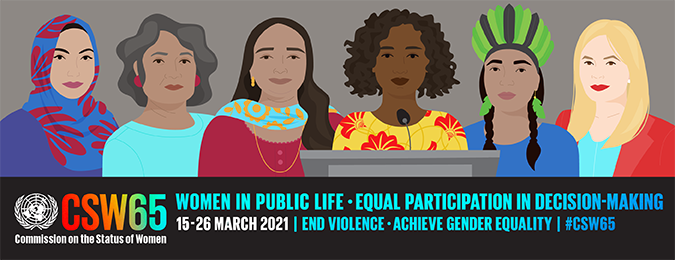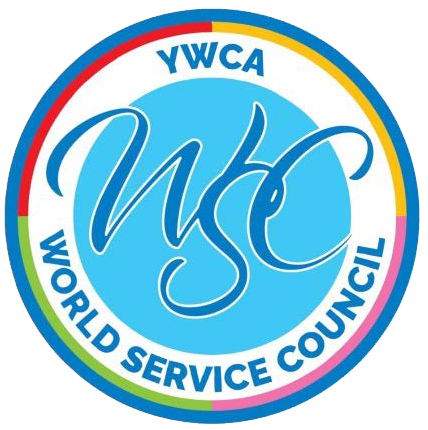
The 65th session of the Commission on the Status of Women (CSW) in 2021 will consider “Women’s full and effective participation and decision-making in public life, as well as the elimination of violence, for achieving gender equality and the empowerment of all women and girls” as its priority theme. To take stock of current research and assist the Commission in its deliberations on the priority theme, UN Women convened a virtual Expert Group Meeting (EGM) in October 2020.
The EGM defined public life, broadly, “the realm within formal political processes are embedded, and activities concerned with public and political issues take place. It can include but is not limited to the work of government media, civil society organization, networks of activists and other figures in public-facing roles. People’s participation within public life can be characterized as formal and informal.”
Observed was the role feminist organizations play in supporting and amplifying the work of women in public life, including their calls for more open and enabling environments, safe spaces online and offline for organizing, and more support for capacity-building. The pressing issue of violence against women in political and public life was raised throughout, with particular attention focused on its causes, manifestations, effects and ways to prevent it, as well as concerns about gender-based violence in contexts of democratic backsliding.
The EGM developed action-oriented recommendations to address gaps and support implementation of the Beijing Platform for Action and the 2030 Agenda for Sustainable Development. The objective of the recommendations is to achieve gender equality and the empowerment of all women and girls through ensuring women’s full and effective participation and decision-making in public life, as well as the elimination of violence. This report summarizes the context, challenges and recommendations discussed and agreed by the experts during the meeting. The recommendations require a global effort that acknowledges the centrality of boys and girls in changing attitudes and supports coalition-building between feminists, political parties, elected officials and grassroots communities. The recommendations reflect a belief that despite significant challenges identified by experts there remains great optimism for what is possible through coordinated, global efforts to achieve women’s full and effective participation and decision-making in public life at local, regional, national and global levels.
The challenges women face in equal decision-making participation are multifaceted. Social and cultural norms hold women back from political participation by creating a vicious cycle: the political arena is seen as male, women stay out, or are kept out, and they do not feel capable as leaders. The norms that harm women and girls, and prevent their participation, are not abstract. They have material impacts and confine women’s experience to reductive binaries, such as choosing between caring for their loved ones and participating in public life. Women who are ‘othered’ face additional constraints to participating and these can be specific to their social location. For example, paternalistic and sexist behaviors conspire to produce and compound the negative experiences of young women who wish to lead, especially those with a feminist agenda. Acts and threats of violence serve as both cause and consequence of women’s limited participation in public life. The elimination of violence against women and girls remains critical for achieving women’s full and effective participation and decision-making in public life.
The glacial shift in values about public life and gender roles, combined with increases in the visibility of women’s leadership over the last 25 years, have contributed to a significant backlash against women’s rights. Indeed, authoritarian, populist and traditionalist parties and leaders have secured greater political power, and their influence in public discourse and policy responses has continued, or restored, gender discrimination and increased violence against women in public life. The backlash has been typified by rollbacks in exercising rights and a common positioning of feminism and women’s rights as an enemy as when gender “ideology” is used as a term or concept to justify dismantling hard-won human rights for women. Hand in hand with democratic backsliding, the backlash is most keenly felt by women’s rights organizations, women human rights defenders and women leaders on the frontlines of protecting women’s rights and even democracy itself.
Crises both hasten and heighten decision-making processes and lead to bypassing norms in the interest of addressing immediate and pressing concerns. The year 2020 brought with it the ongoing Covid-19 pandemic – the full impact of which is unprecedented and still unfolding. Women have been disproportionately affected by the pandemic’s impacts. Certainly, violence against women and girls has emerged as a shadow pandemic. The stresses of the virus must not be used to excuse or further legitimize violence against women and girls or exclude women from public life. Covid has also hit women hard with loss of jobs, leading to an increase in precarity and impoverishment that affect racialized women and immigrant women disproportionately.
Watch this space for more info on the 65th Session of the UN’s Commission on the Status of Women and ways to access meetings and workshops online.
